|
Normal Pressure Hydrocephalus (NPH)
Gary E. Kraus, M.D.
Medical Director of Neurosciences
Associate Medical Director of Gamma Knife
West Houston Medical Center, Houston
Texas
Normal pressure hydrocephalus (NPH), more commonly known as NPH, is a condition in which a patient may experience a gradual
deterioration in gait, and may develop symptoms of dementia and difficulty
with bladder control. Since it may occur without a known cause, it may be
difficult to distinguish from Alzheimer’s disease or dementia.
The condition of NPH consists of an enlargement of the
ventricles in the brain, cavities filled with cerebrospinal fluid. Daily,
the brain produces almost a half a liter of this clear fluid, which then
drains back into the large venous sinuses (veins) surrounding the brain.
When these return passageways into the veins become blocked, there is a
buildup of spinal fluid within the brain. While the cause of this buildup
is often unknown, on occasion a cause may be found. Anything which blocks
these passageways back into the veins may cause NPH. When a patient suffers
the rupture of an aneurysm within the brain, the leaking blood may block
these channels. Infection around the brain (meningitis) and head trauma may
also be causes. The brain slowly expands to compensate for the buildup of
fluid, and symptoms may develop on a gradual basis.
The diagnosis of NPH is best made by clinical symptoms,
and tests are used to confirm this. The main feature is gait disturbance,
and limb movements may be slow. The other two components of the disease,
memory loss and slowing of thought, and urinary incontinence, may occur as
well. The rate of onset is quite variable, and in some cases, the syndrome
may develop months or years after the occurrence of a known cause.
Because the development of symptoms of normal pressure hydrocephalus (nph)
is often slow and gradual, the disease if often left unrecognized, and many
people suffering from it are assumed, by family members, to be "just getting
old," or to have Alzheimer's or dementia.
Once there is suspicion of NPH, the next step is to
confirm this with imaging studies. CT and MRI scans of the brain are very
helpful. Isotope cisternography is another useful study. This test
consists of the placement of a radioactive isotope within the spinal fluid
in the low back, and watching over the next two to three days as to how this
isotope travels into and around the brain.
Once the diagnosis of NPH is felt to be made, there is
the option of simply watching things, or of considering a surgical
procedure to attempt to reverse some of the changes. The most common
surgical procedure for this consists of the placement of a
ventriculoperitoneal shunt (VP shunt), which is a tube which drains fluid
from the brain to the abdomen. The surgical procedure consists of the
surgeon making a small hole within the skull, passing a tube into the
ventricle within the brain, and tunneling the other end of the tube, beneath
the skin, to the abdomen. The amount of fluid which is allowed to drain
through the tube (from the brain to the abdomen) is regulated by a valve
within the shunt. The pressure setting on the valve (regulating the
pressure at which fluid is allowed to pass through the tube) may be fixed,
or it may be adjustable (as provided by a number of programmable valves on
the market). The programmable valve allows the surgeon to gradually adjust
the pressure during follow-up visits in the office.

Just as the progression of the symptoms of NPH is
gradual, the improvement in the symptoms after surgery is also, often, very
gradual.
While there are risks of complications and there are no
guarantees that a VP shunt procedure will necessarily help, the operation
does provide hope for improvement of some of the relentless symptoms of
Normal Pressure Hydrocephalus (NPH).
If you or someone you know is suffering from the
symptoms described above, or if you have any questions regarding NPH (normal
pressure hydrocephalus) or the
surgical treatment involved, please contact Gary E. Kraus, M.D.,
neurosurgeon and Medical Director of Neurosciences at West Houston Medical
Center, Houston, Texas. He can be reached at 281-870-9292.
illustration with permission from Medtronic, Inc.
Of note, is that NPH ( normal pressure
hydrocephalus) is often a slow, indolent process,
and being aware of its symptoms is the first step in diagnosing the
condition. Family members are often so accustomed to the condition,
that they do not recognize the symptoms of NPH. NPH is relatively easy
to screen for, and MRI or CT scanning, together with a history and exam from
a physician, can often detect the problem of NPH. The deterioration
which NPH causes, is, in most cases, not life threatening, but reversing the
condition can have such a tremendous benefit on the quality of life.
Causes of Normal Pressure Hydrocephalus (NPH)
NPH (normal pressure hydrocephalus) may be associated with trauma, infection around the
brain, bleeding around the brain, but in many cases, no cause may be found.
Prevalence of NPH (normal pressure hydrocephalus) In
Society
In the United States, there are roughly 7,000,000 cases
of dementia, of which 350,000 are most likely due to NPH (normal pressure
hydrocephalus). Of these, approximately 11,500 have been treated,
leaving a large number of patients who have a potentially treatable cause of
dementia, but have not been treated. Remember, NPH (normal pressure
hydrocephalus) is the only significantly treatable cause of dementia.
More Information On NPH : NORMAL PRESSURE HYDROCEPHALUS
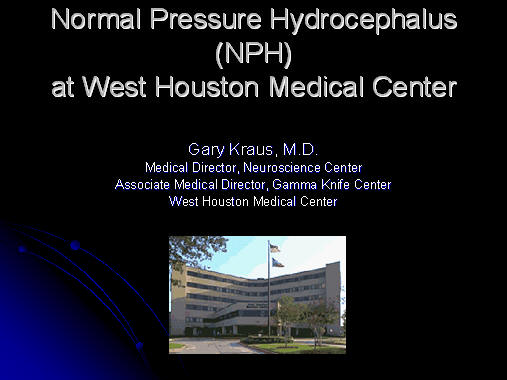
Normal pressure hydrocephalus (NPH) is an important disease to recognize,
because it is one of the only potentially treatable causes of dementia.
As we will discuss here, patients have enlargement of their ventricles,
which are the fluid filled spaces which normally exist within the brain.
In these patients, these spaces become quite large, and the white matter,
which is the connecting tissue between the nerve cells of the brain, become
stretched. This often results in the development of three symptoms:
1) difficulty with gait (gait ataxia); 2) incontinence of urine (difficulty
controlling their urine), and 3) dementia (memory difficulties, less able to
take care of themselves). This condition, once it is accurately
diagnosed, may be treated with a surgical procedure, known as a
ventriculoperitoneal shunt, which will shunt spinal fluid from the brain,
and typically deliver it to the abdomen, from where it is absorbed back into
the blood.
In this discussion, we will go into the background of Normal Pressure
Hydrocephalus (NPH), including its diagnosis, treatment and results.
NPH: normal pressure hydrocephalus: magnetic gait
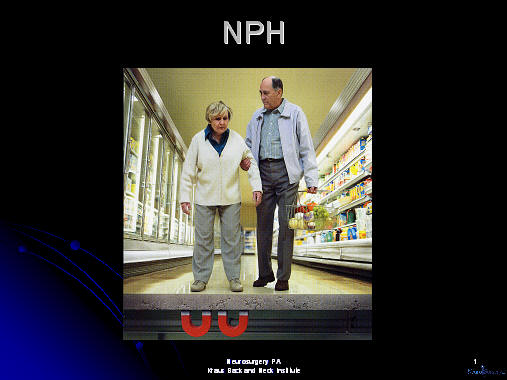
Patients suffering from NPH (normal pressure
hydrocephalus) often exhibit a gait which can be described as magnetic.
These patients have difficulty lifting their feet off of the ground as they
walk. In the picture above, a magnet is seen under the floor, beneath
the person's feet, which indicates a magnetic effect on the patient's legs..
gait after treatment of NPH

The picture above, illustrates, that once the NPH (normal pressure
hydrocephalus) is treated, the gait may improve, and the patient may resume
a more normal gait.
What is NPH?
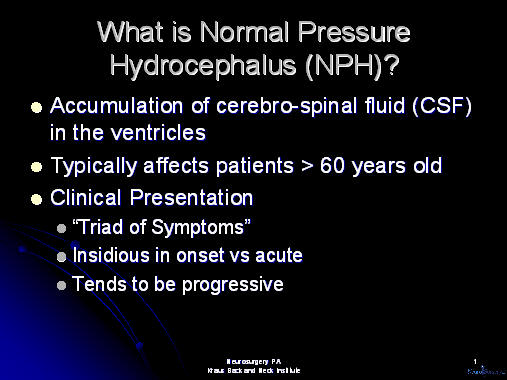
The name normal pressure hydrocephalus (NPH) is a long and confusing name.
But what is it? Essentially, it means that there is too much fluid on
the brain. But the fluid is not under extremely high pressure (as may
be the case in other types of hydrocephalus), therefore it is called normal
pressure hydrocephalus. It typically affects patients over the age of
60, although younger patients, may, on occasion be affected. It
typically presents with the gradual onset of the triad of symptoms which
were mentioned previously. These symptoms are 1) difficulty with gait,
or gait ataxia, 2) urinary incontinence, and 3) dementia, or
difficulty with memory. Because the onset is very gradual and
insidious, the symptoms are often missed. For example, if a patient
suddenly suffers a stroke, and is unable to more an arm or leg, this is very
obvious, and the patient is taken to an emergency room, where a diagnosis of
stroke may be made. But if the changes affecting the patient are
gradual, and occur over the course of months to years, the friends and
family of the patient don't usually think that there is something wrong, and
the slow deterioration of walking and incontinence and memory is often
attributed to aging. For this reason, the diagnosis is often missed.
anatomy of normal pressure hydrocephalus (NPH)
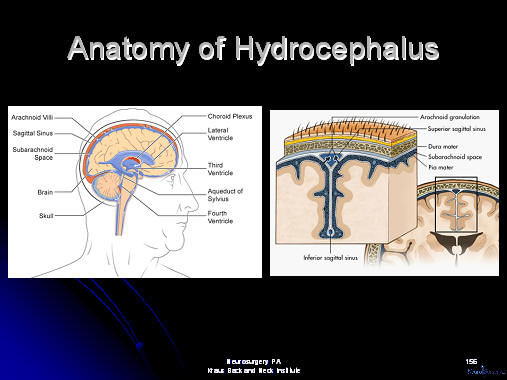
dilated ventricles seen in NPH
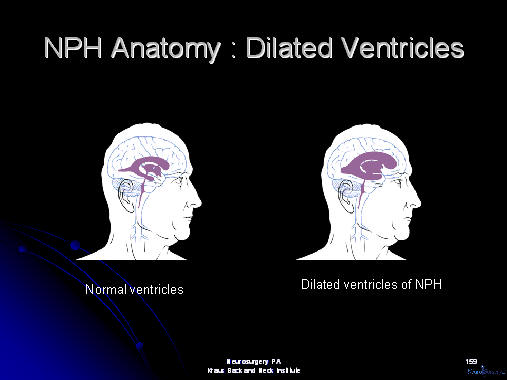
symptoms of NPH
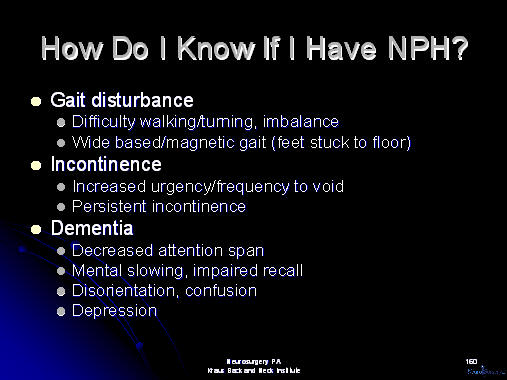
symptoms of nph: gait disturbance / ataxia, incontinence, dementia
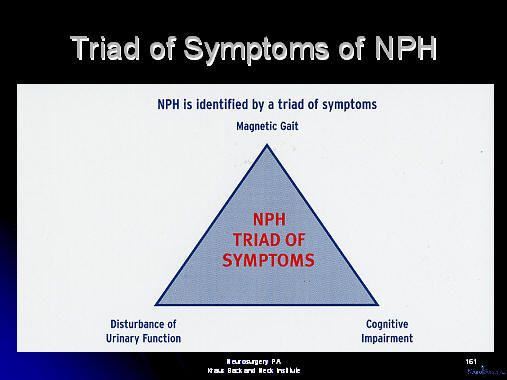
prevelance of NPH (normal pressure hydrocephalus) in the united states
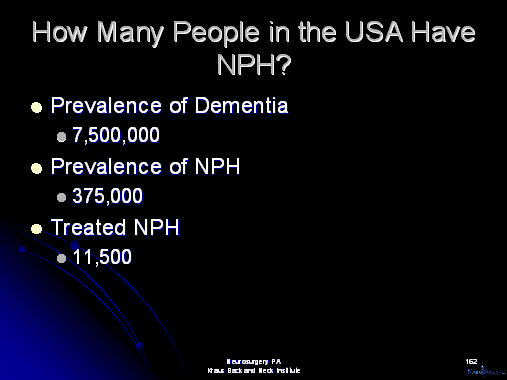
rule out Parkinson's disease or Alzheimer's disease
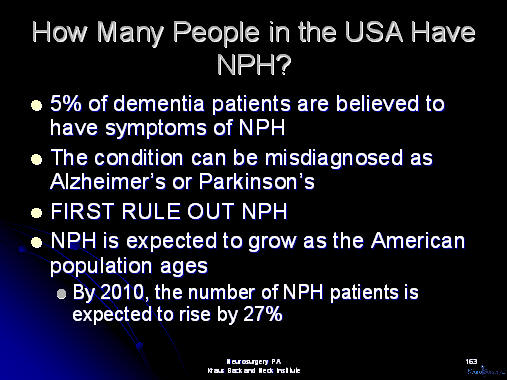
NPH can mimic Parkinson's disease or Alzheimer's disease
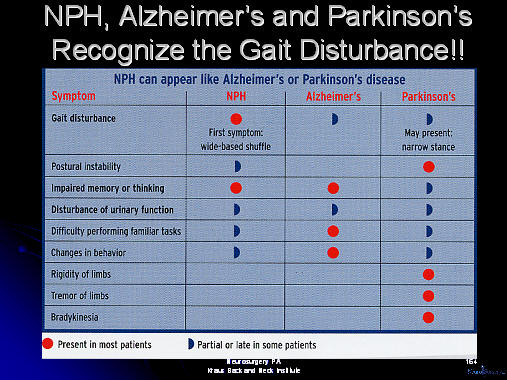
diagnosis of nph
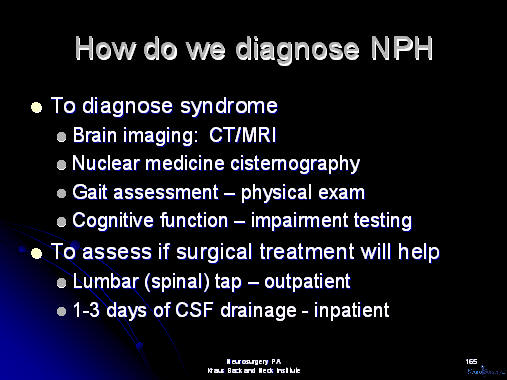
mri scan of brain with nph shows dilated ventricles
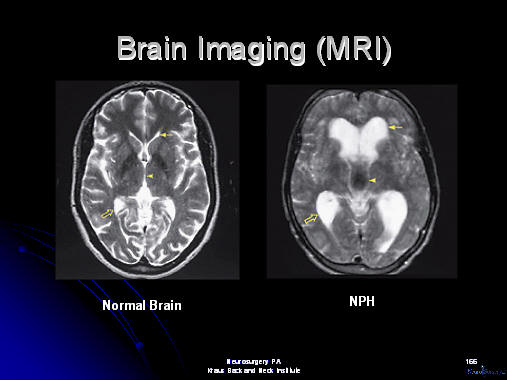
nuclear medicine study shows delayed clearance of ventricles, in patients
with nph
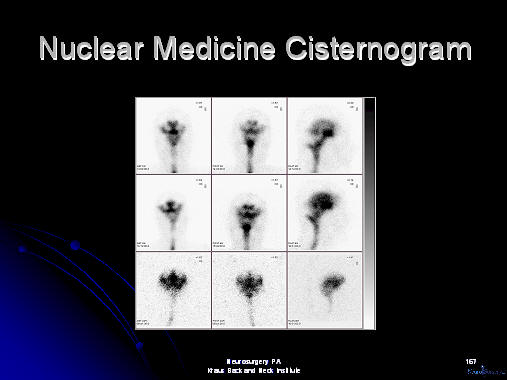
TREATMENT OPTIONS FOR NPH
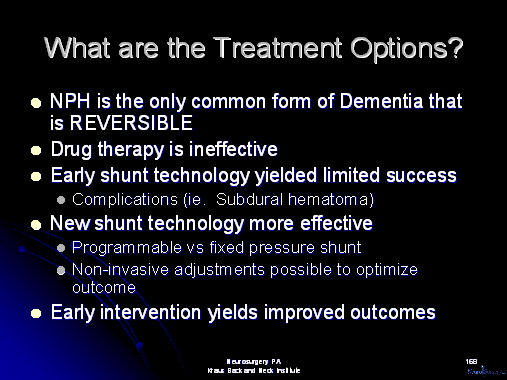
ventriculo-peritoneal (VP) shunt surgery
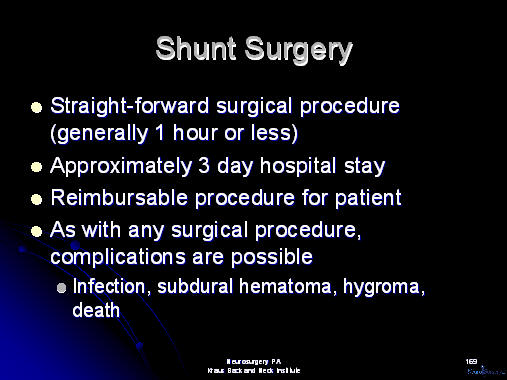
programmable ventriculo-peritoneal shunt valves (medtronic, codman)
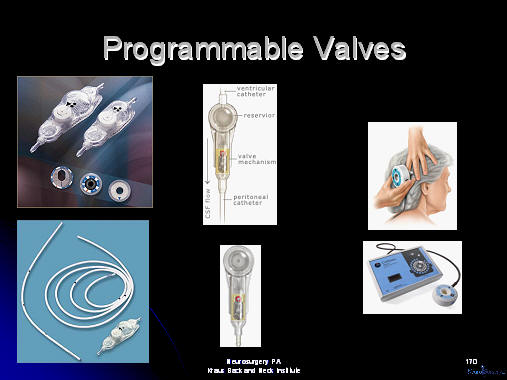
programmable ventriculo-peritoneal shunt valve can be reprogrammed in the
office
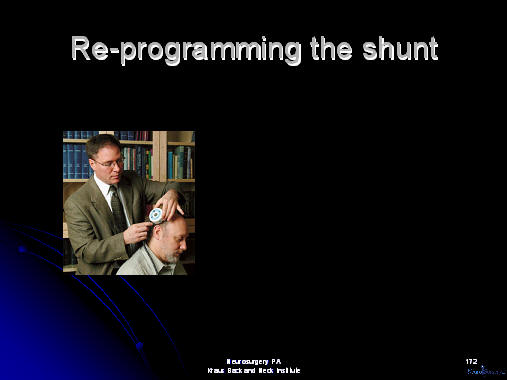
which physicians diagnose and treat NPH?
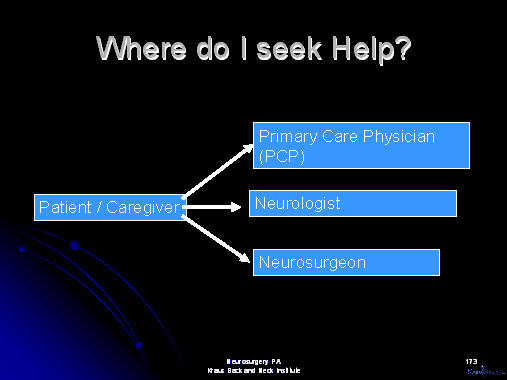
review of symptoms of nph
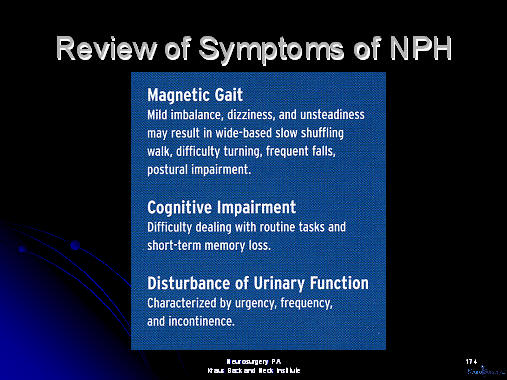
summary of treatment of NPH; Houston, Texas
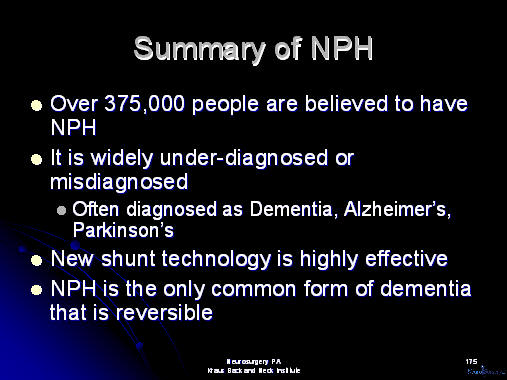
Houston, Texas
Many images provided by Medtronic, and Codman.
|

